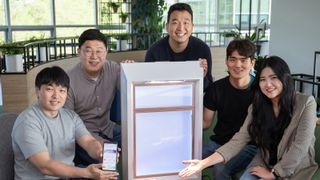SunnyFive, the most intriguing of the new startup companies, is seeking to develop a “window-shaped lighting device that produces artificial sunlight”. The idea is that the artificial window can simulate the full range of lighting conditions throughout the day, mimicking the sun’s movement across the sky. Samsung also claims that the SunnyFive device will help users to synthesize vitamin D (a process in the human body that requires sunlight). This means that you’ll be able to generate vitamin D without exposing yourself to the actual sun, whether by choice or necessity. People with fairer skin are sensitive to sunlight and can easily burn and age their skin through overexposure to the sun’s rays, especially during summer. The SunnyFive could allow our fellow fair skins to get access to the sunlight they need without endangering themselves during summer and heatwaves. Likewise there are people who live in conditions where access to sunlight isn’t easy, or even possible. This ranges from those who live in basement apartments and or sleep in rooms with no windows, all the way through to those living in the arctic circle or serving aboard submarines and ships. Traditionally, people have been able to treat this lack of natural sunlight by using one of the best light therapy lamps (opens in new tab), also known as light therapy boxes. These are also drafted in during the autumn and winter to help ease the symptoms of Seasonal Affective Disorder (S.A.D.) and its less debilitating cousin the ‘winter blues’. In a nutshell, light therapy lamps simulate strong sunlight (the kind you’d expect at midday on a very sunny day), and have an average light output of around 10,000 lux (lux is the light intensity measurement). Doctors recommend them to be used for around 30-45 minutes a day. Light therapy can help boost a person’s mood, which is why they’re used to treat S.A.D., and to help regulate a person’s sleep-wake cycle, leading to more consistent and better quality sleep. These lamps are often placed on desks and bedside tables and used in the morning, as the effects of light therapy can be quite physically energizing. If the SunnyFive artificial window offers a similar health benefit, this could become a great wellness tool for many throughout the darker, colder months, as well as for those who cannot get a lot of natural light at home regardless of the season - especially those who work from home (opens in new tab) in these conditions. While it’s normally associated with building everyday products like the best smartphones (opens in new tab) and TVs (opens in new tab), Samsung is also something of a hotbed for innovation. Samsung started it’s C-Lab program in December 2012, with the goal of helping its employees start up spin-off companies if they have groundbreaking ideas that don’t fit within Samsung’s current remit. The program provides the startups with investment and business advice to help them succeed, while also offering a five year safety net that lets employees take their old jobs back if the venture isn’t successful or they want to return for other reasons. To date, 163 employees have worked together to establish 45 new startup companies. These new companies have raised 45 million dollars between them, tripling their value since they were originally created. The other four startups that were announced today aren’t quite as sci-fi and out there, but they’re interesting nonetheless. Blockbuster is a video editing app that lets people easily apply CG effects to their videos. Let’s hope things go better for it than Blockbusters, who famously got steamrolled by Netflix (opens in new tab) and the streaming service revolution. There’s also Hyler, a smart highlighter that also scans and digitizes the words that you highlight, not dissimilar to a smart pen. RootSensor is a UV sensor that detects how much UV exposure a person is receiving, which could have applications in the best smartwatches (opens in new tab) and fitness trackers (opens in new tab). Finally there’s Haxby, a smart study note service that records incorrect answers from student workbooks and recommends appropriate study materials based on what they need to learn and their ability levels. We wish all of these bold new startups the best of luck and we look forward to seeing these products if and when they make it to market.
